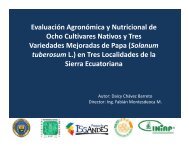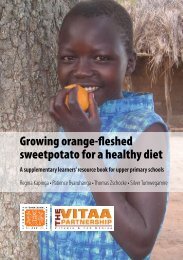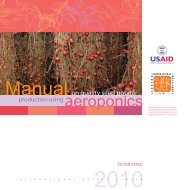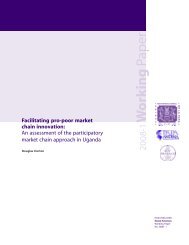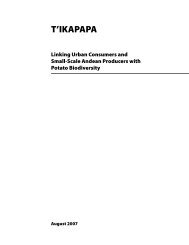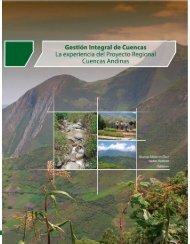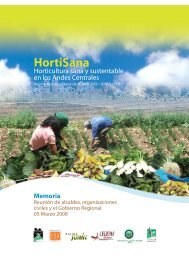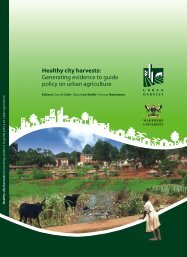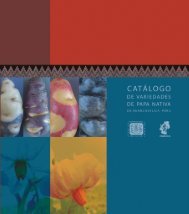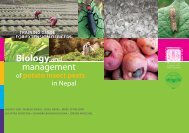Impacts of Urban Agriculture Annual Report.p65 - International ...
Impacts of Urban Agriculture Annual Report.p65 - International ...
Impacts of Urban Agriculture Annual Report.p65 - International ...
- No tags were found...
Create successful ePaper yourself
Turn your PDF publications into a flip-book with our unique Google optimized e-Paper software.
KARI in July 2004. One <strong>of</strong> the recommendations thatcame out was for KARI and the Ministry <strong>of</strong> <strong>Agriculture</strong>to spearhead an urban and peri-urban agriculturereview process. Thus KARI, in conjunction with theMinistry <strong>of</strong> <strong>Agriculture</strong> through the Provincial<strong>Agriculture</strong> <strong>of</strong>fice in Nairobi, assumed a leading role inurban agriculture in Kenya. They later organised a series<strong>of</strong> workshops in collaboration with Mazingira Instituteand <strong>Urban</strong> Harvest with the aim <strong>of</strong> providing anenabling environment for UPA&L. Information wasexchanged, policies were debated and evaluated,different perspectives were considered and it wasdetermined who should take on the responsibility tocarry the policy process forward. Although KARI took arole in organizing the workshop, one <strong>of</strong> the results wasthe recognition that the Ministry <strong>of</strong> <strong>Agriculture</strong> is themost appropriate institution to promote a nationalpolicy change. It was agreed that this role should be builtupon extensive research and analysis, the creation <strong>of</strong> aforum for dialogue among government, private and thecommunity sectors, and crucially, the establishment <strong>of</strong>farmers’ network to ensure a voice for the producers inthe policy change process. Mazingira Institute and<strong>Urban</strong> Harvest have continued to support this “sectoralmix and cooperation model”, as well as supporting riskassessment, participatory approaches to policy reviewand legislative reform.The platform established by the 2003 workshop wasnamed the Nairobi and Environs Food Security,<strong>Agriculture</strong> and Livestock Forum (NEFSALF). The forumserves as a space for the exchange <strong>of</strong> ideas aboutdifferent positions, priorities and activities on UPA&L. InJanuary <strong>of</strong> 2004, the Mazingira Institute, funded by theNational Resources Institute (NRI) <strong>of</strong> the UnitedKingdom, organised the NEFSALF “Community SectorMeeting” aimed at facilitating group organization andbuilding networks at the community level. The outcome<strong>of</strong> this meeting was the establishment <strong>of</strong> the FarmersNetwork in mid 2004, which already has 105 members,some <strong>of</strong> these members being groups with theirrespective members.Another development <strong>of</strong> the Forum has been toimprove the access <strong>of</strong> farmers to the Ministry <strong>of</strong><strong>Agriculture</strong> and municipal services through theestablishment <strong>of</strong> jointly agreed upon strategies. As aresult, farmers identified the need for training as apriority. Two training courses have already taken place.The Forum represents an ideal space for thegovernmental institutions to become sensitive t<strong>of</strong>armers needs and recognize and promote the benefits<strong>of</strong> UPA&L in Kenya.The work <strong>of</strong> the forum, as well as from research resultsgenerated by <strong>Urban</strong> Harvest and other local andinternational organizations have increased knowledgeabout and understanding <strong>of</strong> UPA&L issues. This has ledto an improvement in the institutional environment inNairobi and to the possibility <strong>of</strong> national governmentmaking policy changes in favour <strong>of</strong> UPA&L. One examplehas been land reform policy. The task force working ona new national land policy invited <strong>Urban</strong> Harvest toparticipate in the drafting <strong>of</strong> the new policy and to coauthor,with the Ministry <strong>of</strong> <strong>Agriculture</strong>, a paper on urbanagriculture in Kenya to inform the policy process. Thedraft policy now includes urban land specificallydestined for agriculture as well as urban land set asidefor waste recycling, yielding compost for use in localagricultural production.Multi-stakeholder initiatives linked to urban agricultureand livestock have also been launched in Nakuru, theprovincial capital <strong>of</strong> Kenya’s Rift Valley. Followingresearch carried out in 2004 by <strong>Urban</strong> Harvest and KenyaGreen Towns Partnership Association, a Kenyan NGOactive in urban development and urban agricultureissues, it was apparent that despite support by the citycouncil on the ground, by-laws in Nakuru were unclearand in some ways unfriendly towards urban farming and41



